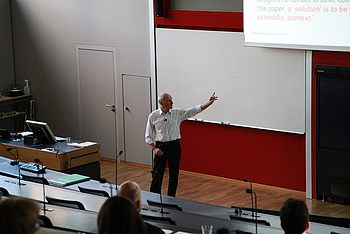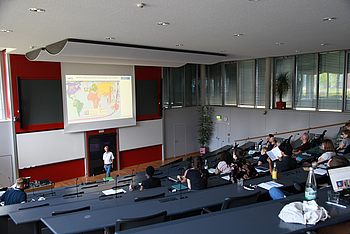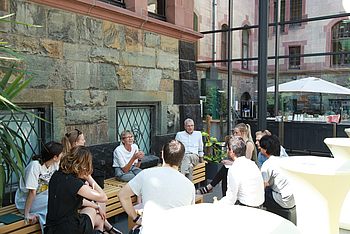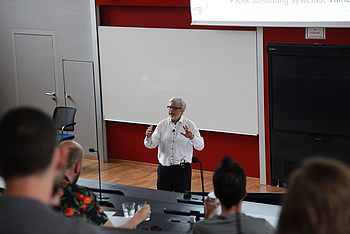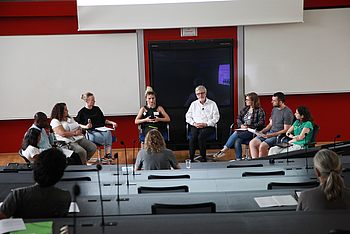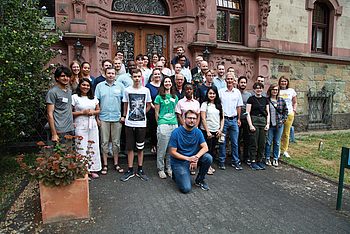A humourus and extensive report on the Summerschool can be found here.
Why not rocket all the radioactive waste into the sun?
Who would welcome a final disposal site in his backyard?
It was questions like these, that were discussed by 53 participants and lecturers from 18 countries thorughout the first TRANSENS Summerschool at Physikzentrum Bad Honnef from Aug. 19th. through Aug. 28th. The audience was comprised not onlay of researchers ranging from the student up to the renowned expert level in Physics, Chemistry, Biology, Geology and Social Sciences but also of interested non-experts from the broader public society.
The event started with an introduction by the organizers Wolfgang Schulz and Clemens Walther from Leibniz University Hannover, and Klaus Röhlig (TU Clausthal) into radioactivity, radiation protection and the basics of reactor design and disposal options, with the latter ones being compared to other - somethimes even longer lived - hazardous wastes.
In the following days the transdiciplinary approach was introduced to the students and applied to the topic of final disposal of nuclear waste.
But what is transdisciplinary research? More than a modern catch phrase used in project ptoposals? Christian Pohl and Pius Krütli (ETH Zürich) explained: While multi-disciplinary research has the differnt scientific branches work on a subject in parallel, inter-disciplinary research seeks to bring these dsciplines together in a co-working process. Transdisciplinary research goes one step further and reaches out of the scientific community to involve and co-work with public persons outside of the scientific realm to solve real-world problems of societal impact.
This approach comes with specific challenges for instance in the communication. Most people don't listen to understand but to reply.
Dies stellt besondere Herausforderungen an die gemeinsame Kommunikation. Die meisten Menschen hören nicht zu, um zu verstehen, sondern um zu antworten. You want to contradict? Than read this: 'Nobody needs radiation protection!' With these words - headed towards radiation protection expert Clemens Walther - psychologist Oliver Sträter (University Kassel) began his lecture on communication. The former replied energetically: 'What is Psychology good for when it comes to finding an optimal site for final disposal?' Their discussion was just a game, set to unveil the traps in communication. It is flaws in communication that lead to mistrust in companies of all kind that are one main reason that lead to major accidents like the failure and crash of the Boeing 737MAX.
Even more grave: How can a good communication be ensured over several thousands of years and presumably between very different cultures. Take the swastica for instance. While it has been used for instance in India as a symbol for wealth for hundrets of years it is a symbol of the Nazi horrors in Germany and large parts of the western world, nowadays. Who can say what our symbol for radioactivity will be associated to in 1000 years from now?
So, how should we proceed. I Sweden two municipalities applied for becoming the swedish national disposal site. The mayor of the municipality that was not decided to become the future disposal site had tears in his eyes when he received the final decision. The 'winner' major Jacob Spangenberg emphasized during the Summerschool the importance of trust into the institutions responsible for the finding and construction of a final disposal site. Both sewdish communities had a long and trust-building history with nuclear facilities in their municipality which greatly boosted trust into the organizations. And without the trust of the local public, no road will lead to the acceptance of a final disposal site at any given location - be it as scientifally sound as it may.
